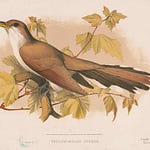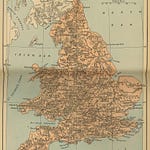When my mind returns to my childhood, I can’t say that I ever enjoyed the scenes that built up the soul of the young William Wordsworth, the author of our Poem of the Week, a short passage from his lifelong work, The Excursion. I was never a shepherd on the mountains. I never enjoyed day after day outdoors, from dawn to dusk, in any season but the summer, and even in the summer my days were too often broken up into small pieces, and spent too near the house. And still, what do I remember from that childhood?
I remember the vacant lot near our house, where one day I picked wild cornflowers, to give them to my best girl, my mother. I remember the fruit trees in the back yard where we lived for two years, and picking apricots soft and fresh from the tree. I remember the low blueberry bushes that covered the bald top of a glacial outcrop, where I’d go in the summer with a big pail and pick the berries, while my dog was idling about, sometimes tugging a couple right from the bush.
I remember the fine sharp smell of the tomato vines in my grandfather’s garden, and the warmth of the fruit in summer, when I’d go and choose a couple for my mother, liking them best while there was still a little orange and green toward the stem. I remember the glint of the snow-crystals, tiny prisms, when the day was clear and cold, and the very shadows were blue. I remember the mellow orange of the sassafras leaves in the fall, and pulling up a shoot, cleaning away the dirt from the roots, and chewing on what tasted like mint and root beer. I remember the spiky branches of the quince tree from over the fence to our neighbor’s yard, and I remember thinking that it must be a cherry tree, so wonderfully red were its blossoms in the spring. I remember how the snow and the mud crusted over the ditch that drained a little creek from the woods in our neighborhood, with the water flowing freely beneath it.
I have not a single memory of the natural world that is anything but a comfort to me, and as I grow old, I want to sit in the sun and read a book, or shut my eyes and think of nothing but the people the good God has given me to know, and the things I have seen. I don’t mean things like the Washington Monument, or Michelangelo’s David, or the Eiffel Tower, though I have seen them and I am glad of it. I mean the cornflowers.
It’s odd to consider, though, how rich the created world is, and how foreign it is to most of us now. It’s there; it is full of quiet wonders; the cardinal still sings What-Cheer-Cheer-Cheer; the wintergreen still gives its fine scent to the summer sun; the sumac tree still sprouts its cones of fuzzy purple seeds that the deer like to eat; creeks warble away till they reach the housing development and its drains; and the sky still arches above.
And all these things are like balm to the soul. Man did not make them. They are the results of no government plan. They market no products. They are not for sale. They are gifts, simple and sure.
Such was the Boy -- but for the growing Youth What soul was his, when, from the naked top Of some bold headland, he beheld the sun Rise up, and bathe the world in light! He looked-- Ocean and earth, the solid frame of earth And ocean's liquid mass, in gladness lay Beneath him: -- Far and wide the clouds were touched, And in their silent faces could he read Unutterable love. Sound needed none, Nor any voice of joy; his spirit drank The spectacle: sensation, soul, and form, All melted into him; they swallowed up His animal being; in them did he live, And by them did he live; they were his life. In such access of mind, in such high hour Of visitation from the living God, Thought was not; in enjoyment it expired. No thanks he breathed, he proffered no request; Rapt into still communion that transcends The imperfect offices of prayer and praise, His mind was a thanksgiving to the power That made him; it was blessedness and love! A Herdsman on the lonely mountain tops, Such intercourse was his, and in this sort Was his existence oftentimes possessed. O then how beautiful, how bright, appeared The written promise! Early had he learned To reverence the volume that displays The mystery, the life which cannot die; But in the mountains did he feel his faith. All things, responsive to the writing, there Breathed immortality, revolving life, And greatness still revolving; infinite: There littleness was not; the least of things Seemed infinite; and there his spirit shaped Her prospects, nor did he believe, -- he saw. What wonder if his being thus became Sublime and comprehensive! Low desires, Low thoughts had there no place; yet was his heart Lowly; for he was meek in gratitude, Oft as he called those ecstasies to mind, And whence they flowed; and from them he acquired Wisdom, which works through patience; thence he learned In oft-recurring hours of sober thought To look on Nature with a humble heart, Self-questioned where it did not understand, And with a superstitious eye of love.














Share this post